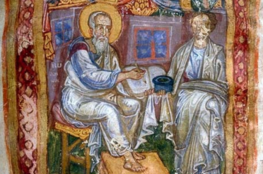George Demacopoulos, a professor at Fordham University and co-director of that institution’s Orthodox Christian Studies Center, is taking aim at extremist Orthodox Christians (specifically two bishops) who are attempting to undermine the upcoming Great and Holy Council’s discussion on ecumenism. Instead of posting an excerpt, let me strongly suggest you read the piece in its entirety. As Demacopoulos makes clear, the position of the Orthodox anti-ecumenists is driven more by ideology (and perhaps nationalism) rather than fidelity to Holy Tradition, and their assertion that non-Orthodox Trinitarian baptisms are invalid has no authentic canonical support. Unfortunately, there seems to be an uptick in neo-Orthodox polemics against Catholics as of late, as evidenced in part by a recent book by one Fr. John Heers which argues that Catholic sacraments are devoid of grace and that this position — which only came in vogue during the last two centuries — is an authentic expression of tradition. For those interested, I briefly commented on Heers’s book and neo-Orthodox here.
With that out of the way, let me be clear that “ecumenism” is a slippery concept, and I certainly have no beef with any Catholic or Orthodox Christian who doesn’t wish for “ecumenism” to devolve into “I’m ok, you’re ok.” (Sadly, in the Catholic world at least, that’s exactly what has transpired over the past 50 years.) Ecumenism between Catholics and Orthodox should always have as its end goal the restoration of full ecclesiastical communion. Period. But of course Rome (first, second, or third) wasn’t built in a day and as anyone who has eyed East/West ecumenical discussions over the past couple of decades well knows, there is a lot of historical debris which needs to be cleared out of the way before the building process can truly begin. Engaging in needless name-calling and pointless polemics only adds to the clutter.




March 23, 2016
On Baptism: Hasn’t there always been some variation in the reception of converts in Orthodoxy, with some churches receiving by baptism at some times, while other churches receive by chrismation or confession at other times? Though rules may have been developed over time, it doesn’t seem like a hard and fast rule has ever been strictly held for all places and all times in Orthodoxy. If this is the case, I do not think priests or bishops who hold to a stricter practice on baptism should be labeled “extremist” unless they are claiming that converts who are received by chrismation / confession are not fully initiated in the mysteries of the Orthodox Church. If they will not commune a convert to Orthodoxy because he / she was not baptized upon reception, then there is more leeway for an “extremist” label.
On Ecumenism: It seems to me that between Catholics and Orthodox, there are two primary approaches: 1) The differences in theology which may exist are primarily on account of historical, linguistic, cultural, etc. differences and, thus, can be resolved over time. There is no ultimate contradiction in theology. This seems to me to be the approach most commonly taken by Catholics. 2) There are actual contradictions in theology which cannot be resolved without either the Catholic Church or Orthodox Church eventually coming to believe or coming to deny doctrine/s they currently hold. My impression is that most Orthodox take this approach, as well as some Catholics. While dialogue will improve relations, no resolution can / will occur until both churches get clearer both to themselves and to each other about whether their differences are contradictions or not. Course, such a clarity might come about through dialogue.
March 23, 2016
Shane,
(1) The practice only started to “vary” significantly in recent centuries, with politics — rather than sound doctrine — influencing how converts to Orthodoxy were to be received. I don’t think it is plausible or sound to hold to the fact that because at such-and-such point such-and-such bishop decided to play hardball, that somehow provides an “Apostolic mandate” (or whatever) for re-baptism or denying grace in non-Orthodox sacraments. Because those who take a hardline view often do so in splendid isolation from concrete Eastern tradition (tradition which has been explored and articulated by a number of scholars), I don’t think “extremist” is an improper label, though “innovator” works, too.
(2) There is no monolithic theology in the East, either. I think what you mean here is a question of doctrine, and it seems to me that the prudent approach would be to explore the non-substantive differences first before falling into the belief that no bridges may be built. And besides, how many people are really qualified to say with any certainty that the gulf between East and West is unbridgeable? I am sorry, but most folks who take this line have no credible theological or historical training.
March 23, 2016
1) I don’t know how much is in the word “significantly,” but the particular conversation about reception of Roman Catholics and Protestants has been around, at least, since the 17th century. Both ways of reception have existed at different times within Orthodoxy. If we expand the conversation to reception in general of schismatics or heretics, then the conversation has been going on since the early centuries of Christianity and, again, different approaches existed back then.
2) You’re right that history does not determine “apostolic mandate.” But I’m not trying to suggest that one of these ways is the definitive apostolic mandate for how reception should always occur. All I’m suggesting is that both forms of reception have legitimately existed within Orthodoxy at different times. Therefore, to reject one as definitely wrong — from an Orthodox standpoint — should come with very careful thinking and argument.
3) Metropolitan Hierotheos does not live in isolation from the Eastern tradition. You may disagree with him, as may some Orthodox on this issue, but to suggest that he neither believes nor practices in continuity with the Eastern tradition of Christianity is hyperbolic at minimum. The same could be said for the monks of Mt. Athos who also have strict practice in this regard. Again, it’s fair to disagree with this practice. It is not, in my opinion, right to suggest that they live in isolation from the Eastern tradition . . . unless there’s something I’m missing in the word “concrete.”
4) I’m not suggesting that bridges can’t be built, nor am I suggesting that Catholic and Orthodox shouldn’t attempt to build bridges. However, for genuine reconciliation, both sides must be able to say in their hearts, “This is the same faith.” The tradition of both churches, on the whole, for the last several centuries would suggest that there are genuine contradictions. I’m not opposed to people taking a different line, but the burden of proof is on that position.
5) How much would be required, in your opinion, for someone to have a valid view about “the gap”? If you raise the standard high enough, you can plead agnosticism forever. But, at that point, you have no basis on which to say that the gap is bridgeable either. People are allowed to make their best judgments about this with what they know. They shouldn’t be prejudiced, and they shouldn’t disregard views to which they are not inclined; but neither should they be dismissed simply because you are not inclined to their view.
6) While I am all for historical and theological learning and scholarship, it is not the case that such learning necessarily leads to a greater apprehension of the Truth. It is, in fact, very possible that an unlearned person may have a greater apprehension of the Truth than someone who has much learning. Scholarship and learning can be helpful in these dialogues, as in the pursuit of Truth, but learning, like most things, requires discernment. You seem to dismiss people like Metropolitan Hierotheos or Fr. Heers because you’ve made a judgment about their historical / theological learning, which makes me wonder: What do you think is historical / theological learning? And is it right to suggest that someone has not attained historical / theological learning because you disagree with their conclusions? Or are you actually trying to suggest that Metropolitan Hierotheos or Fr. Heers haven’t read the relevant sources / texts and thought about them?
March 23, 2016
If folks like Met. Hierotheos base their arguments on history and theology, then it is perfectly reasonable to judge their arguments on that basis and in this case they are clearly wrong and extremely selective in their reading of history and canons. I don’t think anyone is saying that reception of Catholic converts by baptism is absolutely wrong, but Met. Hierotheos is arguing that it is the only legitimate way, which flies in the face of centuries of Orthodox practice. The 1485 synod of Constantinople, which repudiated the union of Florence, issued a rite for reception of Catholics which called for chrismation. This was basically the universal practice until another Constantinople synod in the 18th century required baptism, but this latter decision was not accepted outside of the Greek church. In fact, many Catholics were not even received by chrismation. Greek Catholics were received en masse at the stroke of a pen or the shifting of a border, perhaps even without much awareness at the parish level. As for sprinkling vs. immersion, there are places within the Orthodox church (e.g. parts of Romania) where sprinkling has been done for generations.
March 23, 2016
True, it is fair to argue based on history and theology. But it was not my impression that that’s what was going on with this post. Disagreements about this have occurred and will occur. That’s all fine. I don’t think it’s right to be dismissive about it. While it seems to me that the normative practice is reception by chrismation, it also seems to me that at various times baptism has been an exceptional way of receiving converts. Until a council of all the Orthodox makes a universal judgment on the matter, I suspect it will remain this way.
March 24, 2016
Shane, in Byzantine Orthodoxy this issue tends to be not too much more than a personal opinion, in which supposed canons or historical precedent is used in support.
The ROCOR practice is an example. Depending upon who is in charge the whole issue changes. And not too long ago the ROCOR was even baptising fellow Orthodox, including “converting” clergy from other Orthodox jurisdictions. Now, because personalities have changed, this issue has also done an about face as well.
Race and ethnicity also play a part as well. In Europe, Moscow tends to receive Roman Catholics via chrismation, but received Greek Catholics in the traditional method of confession. But in the Philippines, both Old Catholics, members of the Philippine Independent Church, and Filipino Roman Catholics are received via baptism.
In Antioch, it tends to depend upon the personality of the individual priest. Not too long ago a congregation was received from one of the conservative Episcopal groups, the priest an Byzantine rite Evangelical, re-baptised them all; yet in the same month another large parish from the same ecclesial background was received by chrismation.
Actually, rather difficult to take any of this too seriously.
Oh, strange these Greek bishops who are making the fuss are considered to be without grace by the Greek Orthodox Old Calendarists (using the same history and canons).
March 25, 2016
Hi Dale,
I do agree the differences in practice are a problematic and frustrating feature in Orthodoxy, and I’m not trying to defend one practice or another.
My main contention is that it’s not helpful to attempt to alienate people from canonical Orthodoxy who have not alienated themselves. Besides being a respected and influential figure in Orthodoxy, Metropolitan Hierotheos is not part of an Old Calendar schismatic group. I simply don’t think these two can be justly identified without distinction. And I don’t understand the word “extremist,” which is a word we often use to refer to actively violent fringe groups.
If unity between Catholics and Orthodox is the goal of this dialogue, then this is not going to be accomplished by furthering division within Orthodoxy.
I’m not trying to justify the state of Orthodoxy, just to propose a more intelligent critique. There was a lot of assertion in this post, and not much engagement.
Lastly, I wanna say I read this blog regularly and respect its author, so I write as a reader and not a detractor.
March 23, 2016
I enjoyed the piece written by Dr. Demacopoulos. I feel qualified to comment on the subject since I was at one time a neo-Orthodox convert. A mixture of bad catechesis, convert zeal, and an inward moral life devoid of the actual practice of virtues, lead me down a path that took me into the Greek Old Calendar movement. In my zeal, I was rebaptized even though I had been Orthodox for a few years.
The neo-Orthodox fear the ecumenical movement as the great pan-heresy. The work of the Joint Catholic-Orthodox Theological commission has produced edifying documents on our shared faith, but many have not taken the time to read or reflect on the papers produced by the dialogue. As one example, I would argue that the North American dialogue has resolved the Filioque issue.
I can remember being so enraged at the betray of Orthodoxy at Ravenna (to read more about the Ravenna document, click here). I’m sure at that time my religious views on Facebook would be listed as “Orthodoxy or death.” Of course, no one I knew actually had read the whole document but everyone was sure that the Orthodox ecumenists had capitulated to the Papists.
There are of course abuses in the ecumenical movement. The World Council of Churches (WCC) is a train wreck and I am glad that the Catholic Church has stayed out of it. In some of his statements to the protestant ecclesial communities, Pope Francis has made some confusing remarks.
The ecumenism worth pursuing most is with the Orthodox Church, for She too is fully Apostolic, living the full sacramental life shared with the Catholic Church.
The neo-Orthodox, while small in number, hold great influence in the Orthodox Church. A recent video of Patriarch Kyril, posted on the ByzTex blog today, is proof. The Patriarch denounces false union. He particularly mentions the union achieved at Florence. To sober-minded Orthodox, one can see that Florence was an effort to solve the division in the Church but for the neo-Orthodox, it was a betrayal of Orthodoxy.
The neo-Orthodox suffer from historical amnesia. One has to simply look at the recent video I mentioned or at recent affirmations of the pseudo-synod of L’viv. They conveniently forget the complex historical realities of Catholic/Orthodox relations since the schism and pick and choose facts to suit their agendas. Contrast that with the openness of the Catholic Church regarding the past. Mistakes were made by the Catholic Church, She willingly admits it, and moves to correct those errors. I pray that this continues to happen on the part of the Catholic Church as well as the Orthodox Church, to bring about unity in the Truth.
Through God’s grace, I was lead out of the Old Calendar movement. I was just burnt out. I returned to the New Calendar Church and eventually was received into the Catholic Communion a few years later. Actually reading what the Catholic Church taught on papal primacy, and the work of sober-minded ecumenists like Pope Benedict XVI and the encyclicals of St. John Paul II, lead me to consider Catholicism. I’ve been a member of the Byzantine-Ruthenian Catholic Church for seven years now.
I pray that the sober-minded Orthodox like the Ecumenical Patriarch prevails at the Great and Holy Council.
March 23, 2016
Best comment I have ever read on this blog. Thank you.
August 12, 2020
Hi! lasix prescription lasix online bestellen
August 12, 2020
recenze Bithoven opce minimálnà vklad Bithoven jak hrát výška marže Bithoven česká republika